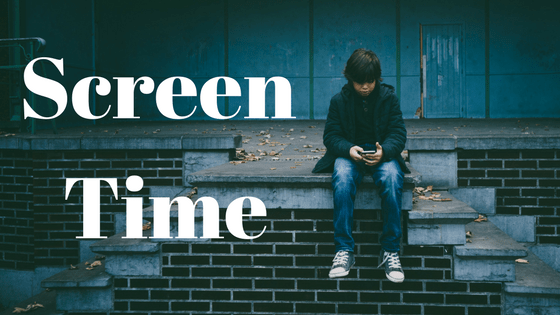Each Year Research Indicates that Children are Exposed to Excessive Amounts of Screen Time.
A public service announcement to parents would probably read along these lines, “Turn off the screens and open the door to outdoor activities for your kids.” Screens have replaced the essentials of a normal childhood and present a real threat to the physical and mental health of children.
Children are growing up relying on screens to get them through more than 70% of their day. Babies are in the rear of cars zoned in on the portable DVD player watching their favorite shows. Toddlers immediately reach for their parent’s tablets when feeling bored or not entertained. School-aged kids are doing school work on chrome books, only to come home and spend more time in front of their favorite game systems. Teenagers are constantly attached to their mobile devices and social media keeps them engaged with less than positive posts. Parents and kids are texting full conversations instead of engaging in meaningful conversation with each other.
Parental Guidance Suggested
Screens have taken over and are diminishing the quality of family time, personal growth/development and physical activity for kids. While not all screen time can be viewed as negative, the extent of use is what tarnishes the positive effects that screen time offers. There are guidelines available from various sources but parents must assume more of the responsibility by enforcing the restrictions placed on screen viewing. In addition to personal opinion, parents can incorporate structure by utilizing the age-based time table that the American Academy of Pediatrics recommends. The AAP suggests that parents become more proactive in planning unplugged playtime for babies and toddlers. There is media that makes a positive contribution to the educational quality for kids that are 18 months and older. The programs should be of high-quality and parents should view the programs with children to incorporate clarity and engage in quality conversation about what is being viewed.
While most studies focus on children five-years and younger, there is an increased need for parents to structure appropriate viewing time guidelines for all young children. The influence factor for teens is one that parents must remain aware of and ahead of in every sense of the phrase. Teenagers interact with each other in chat rooms, private messages, social media platforms, video chats and more. It’s impossible to be with your child 24/7 but monitoring their screen habits is easier than most parents know. Service providers make it possible for parents to control the type of sites their kids interact with and, present tools
to control what hour online content is no longer accessible. There are apps available to download on the parent’s device, as well as the child. It helps to know that as a parent, you can verify that children aren’t abusing the specified guidelines you set forth regarding screen time. Most importantly, parents must lead by example. Have a device-free dinner and take the time to communicate with the children about their day. Parents will be amazed at the mounds of insight children can shed just by conversing with them. Designate two-three hours during a night of the week as family time. This time is to be used strictly for interacting with family through games, talking, physical activity and anything that requires spending time together without any connections to mobile devices or other screens.
Here are a few suggestions (no screen or mobile devices allowed):
- Set-up an ice cream bar with toppings for the family to sit around, chat and snack
- Make plans to attend a sporting event, play or other community activity (no selfies allowed)
- Allow younger members of the family to choose what they would like to do and alternate the suggestions throughout the month
Expert Analysis
Most physicians and child therapists utilize the guidelines set forth by the AAP to recommend screen time viewing limits to parents. This information helps physicians to better understand what they are recommending to those they counsel or treat. If you are concerned that your child(ren) is spending too much time in front of the screen but don’t know what to do, I can help with that. I work with parents daily to help them understand the behavior patterns of their children and to incorporate positive family interaction into the daily lives of their children.
Excessive screen time can present a negative impact on children in several ways. Once one problem sets in, it can lead to many others. It is important that parents understand the mental fatigue that children experience when they spend too much time viewing and not enough time interacting with others and participating in physical activities. If your child spends a large percentage of each day on the computer, tablet, game system or mobile device, there are a few negative impacts this could have.
- Lack of physical exercise could lead to weight gain
- Failure to interact with others could cause him to be withdrawn in social settings
- Mental fatigue could lead to attention deficits
- Excessive screen time could take away from time being constructive and cause grades to decline
Bullying and Negative Exposure
One of the biggest disadvantages that too much screen time presents is that it subjects them to bullying and exposes them to negative ads or posts. We all know that some of the biggest bullies are behind keyboards and only lurk on social media. This is extremely true for kids, especially teenagers. Make sure to speak with your children about proper use of the social media outlets they are on. Explain to them that not everyone has the necessary information to make intelligent decisions and sometimes, they may be faced with one or more of these types of people. Social media is one of the largest marketing and advertising platforms of today. It’s a giant marketing tool that anyone can use to promote their product or brand. Your child will face ads that are not age-appropriate or human-appropriate for that matter. These ads encourage bad habits or shed a negative light on extremely sensitive matters. This is the type of material that will capture the attention of most children and lead them towards a path of destruction.
If you have questions or need to understand what amount of screen time your children should be getting, contact me for a consultation.





